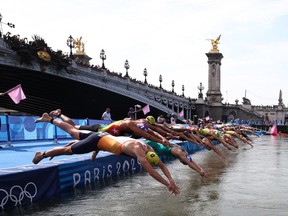There has been no telling what lay below the murky surface of the polluted Parisian river, so no remedy is overlooked

Article content
While experts and officials continue to debate the risk of hosting Olympic events in the Seine, the polluted Parisian river that had been closed to swimming for a century, several athletes have sung the praises of an unexpected home remedy: Cola.
Specifically? Coca-Cola, the ever-present Olympic sponsor.
“The myth of Coca-Cola is true,” Australian distance swimmer Moesha Johnson told The Wall Street Journal. “We will often have a Coca-Cola afterwards just to try to flush out anything inside of us.”
Advertisement 2
Article content
Several athletes told the Journal they’ve been swigging the sugary beverage to stave off any stomach issues that may result from plunging into the Seine.
New Zealand’s team doctor was reportedly seen at the finish line of the women’s triathlon last week with two bottles in hand as he waited for Ainsley Thorpe and Nicole van der Kaay to complete their races.
“There’s no harm in drinking a Coke after a race,” Thorpe told WSJ. “If you Google it, it says it can help.”
Recommended from Editorial
She also said: “I just do what I’m told by the professionals around me.”
There is little to no medical proof that supports the theory that Coke kills stomach-borne bacteria. Dr Maria Abreu, president of the American Gastroenterological Association, told the Journal a healthy stomach is already more acidic than Coke, making it unlikely to make a difference.
“These are young, athletic people, right?” Abreu told the newspaper. “They’re going to be healthy people whose stomach acid is going to be nice and robust.”
Article content
Advertisement 3
Article content
All of the free advertising for the cola giant arrived at a fortuitous moment, with public health organizations calling for the Games to part ways with a lucrative corporate partner.
Concerns over the water quality in the Seine, meanwhile, have also pushed athletes to take probiotics as a preventative measure to avoid illness. The river has failed several tests for the fecal bacteria E. coli, which has a safety limit of 1,000 colony-forming units per 100 milliliters, by World Aquatics standards.
Fludion, the company that carries out testing, takes two measurements: a planktonic E.coli count of “free-floating” bacteria, and a comprehensive E.coli count, “whether free floating or aggregated onto larger fecal or sediment particles.”
The presence of E. coli is an indicator that other forms of bacteria are also lurking, experts say.
Despite regular monitoring, athletes have fallen ill after swimming the river, although officials are no outright blaming the Seine so far.
Portugeuse triathlete Vasco Vilaca reportedly developed “symptoms compatible with gastrointestinal infection,” the Portuguese Olympic Committee said in a statement. Melanie Santos, another Portuguese triathlete, suffered similar but milder symptoms, the statement said.
Advertisement 4
Article content
Vetle Bergsvik of Norway told The Associated Press he also felt sick for 12 hours after a race on Monday, but added that “it’s hard to say if it’s the river or just some ordinary food poisoning.”
Claire Michel, a Belgian triathlete, spent time in the hospital after swimming the Seine. He was reported to have fallen ill from E. coli, which Michel denied. The Belgian team had to withdraw from the triathlon mixed relay because Michel was ill.
“Blood tests showed that I contracted a virus (not E. Coli),” she clarified in an Instagram post.
Finally, Swiss triathlete Adrien Briffod, dropped an event due to stomach issues and Simon Westermann, his proposed replacement, also withdrew from the race because of a gastrointestinal infection. Westermann had taken part in events in the river.
In the years leading up to the Games, federal and city governments banded to spend more than $1 billion to improve the water quality of the turbid waterway, which had been illegal to swim since 1923. and modernize the antiquated sewer systems in Paris. This also included upgrading wastewater treatment plants and building a giant underground water storage basin.
Heavy rains in recent weeks have tested the limits of the Bassin d’Austerlitz, which can reportedly hold 20 Olympic swimming pools of water, causing it to overflow and leak untreated wastewater into the Seine.
“The criticism was not necessary. It was not always constructive,” Pierre Rabadan, deputy mayor of Paris, told ESPN. “Were we right to do it? Was it worth it? Yes, because having athletes swimming in the Seine and having Parisians swimming [there] in the future will help the river.
“It was worth it, even with all the criticism.”
Article content







